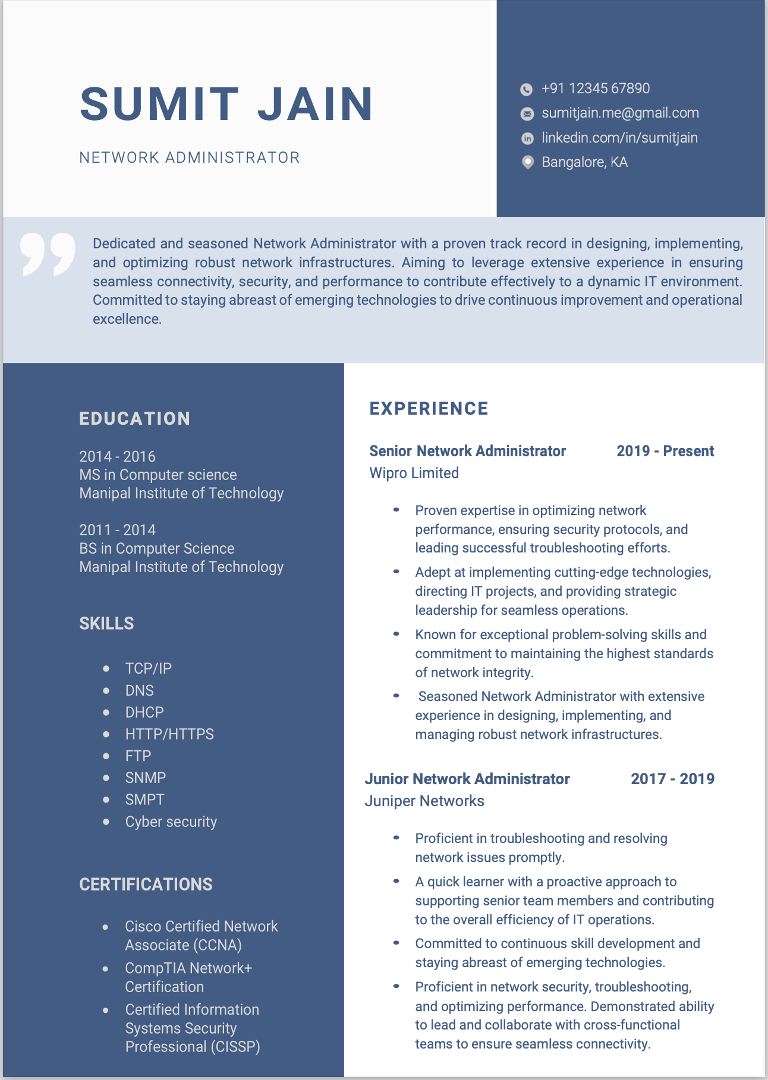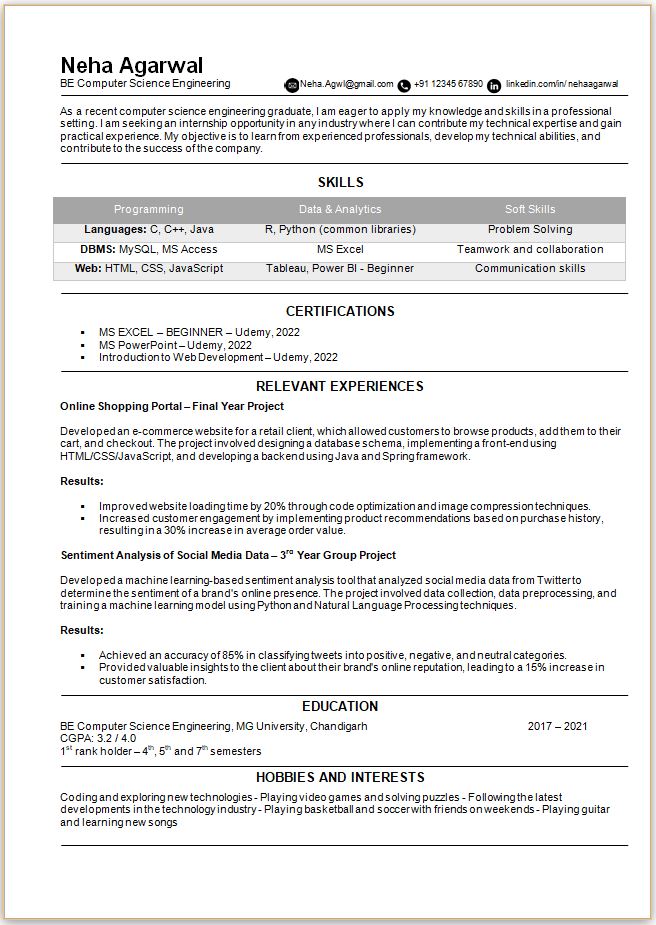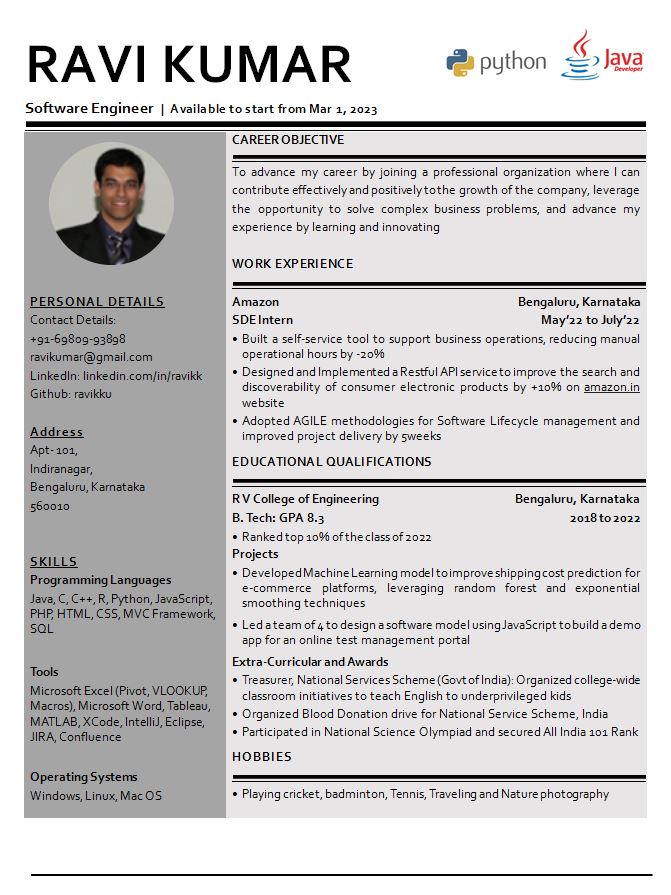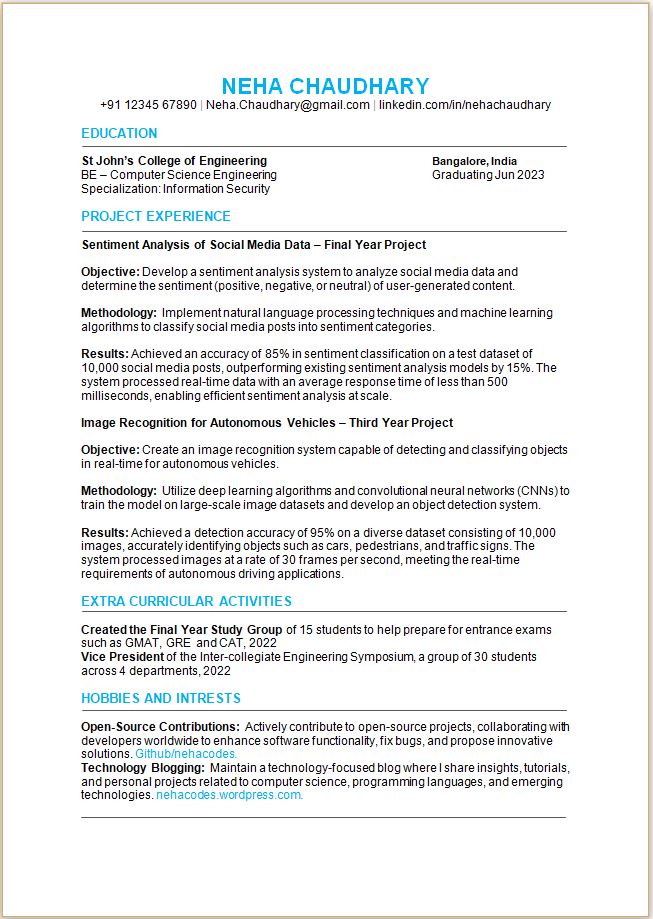Modern Resume
Computer Science Sample in MS Word Resume
Network Administrator
netadm


Objective
Dedicated and seasoned Network Administrator with a proven track record in designing, implementing, and optimizing robust network infrastructures. Aiming to leverage extensive experience in ensuring seamless connectivity, security, and performance to contribute effectively to a dynamic IT environment. Committed to staying abreast of emerging technologies to drive continuous improvement and operational excellence.
Education
BS in Computer Science, MS in Computer Science
Skills
• TCP/IP • DNS • DHCP • HTTP/HTTPS • FTP • SNMP • SMPT • Cyber security
Interests/Hobbies
While resumes typically focus on professional qualifications, adding a section for personal interests and hobbies can provide a glimpse into your personality and potentially create conversation points during an interview.
Here are a few interests and hobbies that can complement a network admin resume:
Home Lab Projects: Mentioning that you enjoy working on personal networking or IT projects at home can showcase your passion for the field. For example, setting up your own server, experimenting with different network configurations, or testing new technologies.
Cybersecurity Enthusiast: If you have an interest in cybersecurity, mention it. Employers often appreciate candidates who stay informed about the latest security threats and measures. You might talk about participating in Capture The Flag (CTF) challenges or staying updated on cybersecurity news.
Open Source Contributions: If you contribute to open-source projects related to networking or IT infrastructure, it's worth mentioning. This demonstrates your commitment to the community and your ability to collaborate on technical projects.
Technology Conferences and Meetups: Attending industry conferences, seminars, or local meetups related to networking or technology can show your dedication to continuous learning and networking with professionals in the field.
Blogging or Technical Writing: If you enjoy writing about technical topics or have a blog where you share your insights on networking or IT, include it on your resume. This can demonstrate your ability to communicate complex technical concepts effectively.
Hiking or Team Sports: Interests outside of technology can also be included. Participating in team sports or outdoor activities like hiking can indicate a balanced and healthy lifestyle, showcasing qualities like teamwork and perseverance.
Remember to keep this section concise and relevant to the job. Tailor your interests and hobbies to reflect positively on your professional image, emphasizing qualities such as curiosity, dedication, and teamwork.
Experience
Senior Network Administrator 2019 - Present
Wipro Limited
• Proven expertise in optimizing network performance, ensuring security protocols, and leading successful troubleshooting efforts.
• Adept at implementing cutting-edge technologies, directing IT projects, and providing strategic leadership for seamless operations.
• Known for exceptional problem-solving skills and commitment to maintaining the highest standards of network integrity.
• Seasoned Network Administrator with extensive experience in designing, implementing, and managing robust network infrastructures.
Junior Network Administrator 2017 - 2019
Juniper Networks
• Proficient in troubleshooting and resolving network issues promptly.
• A quick learner with a proactive approach to supporting senior team members and contributing to the overall efficiency of IT operations.
• Committed to continuous skill development and staying abreast of emerging technologies.
• Proficient in network security, troubleshooting, and optimizing performance. Demonstrated ability to lead and collaborate with cross-functional teams to ensure seamless connectivity.
Additional Inputs
Common interview questions in Network Admin interviews
Network administrator interviews often include a mix of technical and behavioral questions to assess your skills, knowledge, and problem-solving abilities. Here are five commonly asked technical questions in network admin interviews:
Explain the OSI Model and its Seven Layers:
This question assesses your understanding of the fundamental structure of network communication. Be prepared to discuss each layer, its functions, and how data moves through the layers during communication.
Describe the Difference Between TCP and UDP:
Interviewers may ask about the Transmission Control Protocol (TCP) and User Datagram Protocol (UDP). Discuss their key differences, advantages, and when you would use one over the other. Understanding the reliability and connection-oriented nature of TCP versus the speed and connectionless nature of UDP is crucial.
How Would You Troubleshoot a Network Performance Issue?
This question evaluates your problem-solving skills. Walk through a systematic approach to identify and resolve network performance issues. This may involve checking hardware, analyzing network traffic, examining configurations, and using network monitoring tools.
Explain the Purpose of Subnetting:
Subnetting is a fundamental concept in networking. Be prepared to explain why subnetting is necessary, how it helps in optimizing network performance, and the benefits of subnetting for security and efficient IP address management.
Discuss the Differences Between IPv4 and IPv6:
As the industry transitions to IPv6, interviewers may inquire about the key differences between IPv4 and IPv6. Be ready to discuss aspects such as address format, address space, addressing schemes, and the reasons behind the move towards IPv6.
Remember to not only provide correct answers but also demonstrate your thought process, troubleshooting methodology, and the ability to communicate technical concepts clearly.
Additionally, questions may vary depending on the specific job role and the organization's technology stack. Always review the job description and requirements to tailor your preparation accordingly.


